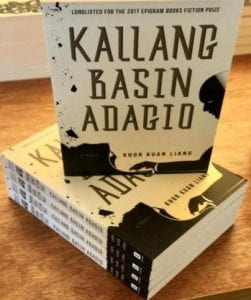Alumnus Khor Kuan Liang majored in English Literature and graduated in 2014. He has since published his first novel titled Kallang Basin Adagio. In the interview below, we catch up with him and invite him to share his views on his novel and on Singapore literature.
Can you tell us what your novel is about and what your motivation is in writing this novel? Can you also comment on your novel’s interesting title—Kallang Basin Adagio?
The novel has universal themes and is set in a future world, which has been ravaged by global environmental catastrophe. In this post-apocalyptic setting, a group of survivors rescue a boy and his musically-inclined humanoid, Doll, on their way to the haven at Kallang Basin. But Doll is no mere android. She has been designed to play some of the most beautiful music the world has ever heard. Music has been a form of catharsis for me and thus prompted me to write this story…
Speaking of music, an Adagio refers to a slow tempo — used chiefly as a direction in music. Adagio for Strings (by Samuel Barber) is a musical piece that has significance throughout my novel. What would become Doll’s most special piece of music was actually composed in 1936 when Samuel Barber encountered a passage from Virgil’s Georgics:
…curve of wave begins to whiten
And rise above the surface, then rolling on
Gathers and gathers until it reaches land
Huge as a mountain and crashes among the rocks
With a prodigious roar, and what was deep
Comes churning up from the bottom in mighty swirls
Born in the chaos of a continent on the brink of apocalypse, such Adagio music certainly resonates with some of the other themes in this novel. The actual Adagio music is over in eight minutes, harmonically unresolved, and if any musical piece can come close to conveying the effect of a sigh, or courage in the face of tragedy, or hope, or abiding love, this is it.
Did studying literature as an undergraduate contribute to the writing of Kallang Basin Adagio?
Certainly; I came across twentieth-century literature texts that revolve around art and artistic endeavours. I decided to examine these themes in the context of a futuristic, post-apocalyptic setting where humanity is already on the brink of extinction. What role does art or artistic endeavours – represented by musically-inclined artificial intelligence in the story – serve when we struggle to survive? This is a pertinent question raised that readers can continue to ponder long after they have read the book.
Can you share some of your views on the current state of Singapore literature?
I think it needs more time to develop and there is still some way to go. However, there also now seems to be more support with events like the annual Singapore Writers’ Festival and initiatives by local publishers like Epigram Books. I have heard of Epigram Books from quite a number of years back but only after they published my novel did I truly see how special and supportive this publisher is. Hopefully more people will see that too.
Do you have any future writing plans? How do you manage writing in a busy country like Singapore?
Like music, writing has been a therapeutic experience for me; shining rays of light amidst the darkness of personal issues I’ve gone through and am still going through. Thus, I will certainly be writing in the future but on other topics of interest, including stories for children. I have stopped teaching for the moment and seek to focus more on writing.
Kallang Basin Adagio can be purchased from Epigram Books (below).

